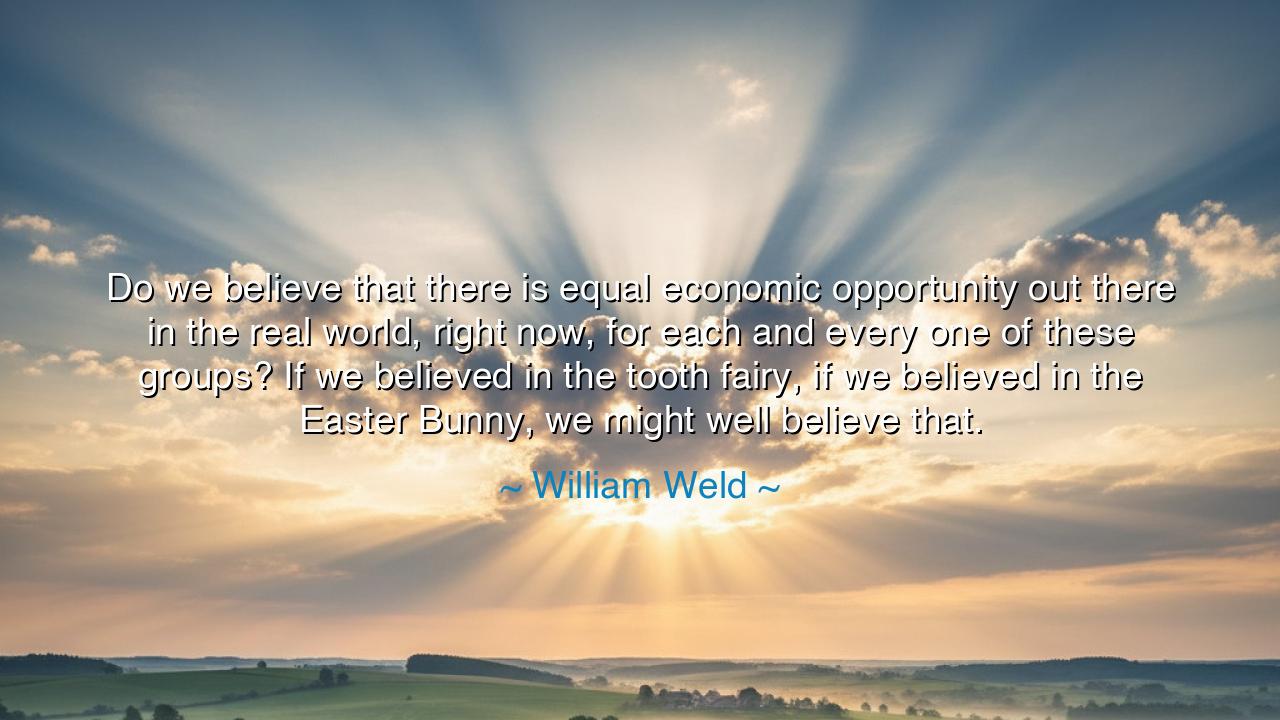
Do we believe that there is equal economic opportunity out there
Do we believe that there is equal economic opportunity out there in the real world, right now, for each and every one of these groups? If we believed in the tooth fairy, if we believed in the Easter Bunny, we might well believe that.






In this piercing observation, William Weld strips away illusion and sentimentality to confront one of the most enduring falsehoods of modern civilization — the belief in equal economic opportunity. When he says, “Do we believe that there is equal economic opportunity out there in the real world, right now, for each and every one of these groups? If we believed in the tooth fairy, if we believed in the Easter Bunny, we might well believe that,” he wields irony like a blade. Beneath the gentle humor lies a deep lament — a recognition that justice without equality is an illusion, and that societies often comfort themselves with myths rather than confront uncomfortable truths. His words are both satire and prophecy, a call for awakening in a world lulled by the dreams it tells itself.
Throughout the ages, men have woven myths to explain their suffering and justify their hierarchies. In the past, kings declared that their thrones were ordained by heaven; today, nations declare that success is earned equally by all. Yet both illusions conceal the same injustice. Weld’s comparison to childish belief — in the tooth fairy and the Easter Bunny — reminds us that even adults can cling to comforting fables when the truth feels too heavy to bear. He challenges us to look at the world not as it pretends to be, but as it is: divided by class, gender, color, and circumstance, where opportunity is too often inherited rather than earned.
In the style of the ancients, this quote would be read as a parable against false faith — not the faith of spirit, but the faith in comforting lies. Just as the Greek philosophers spoke against the illusions of the cave, where men saw shadows and called them truth, so too does Weld command us to leave the cave of denial. Equality cannot exist where the starting line is not the same. The child of the poor farmer cannot compete with the heir of the merchant unless society itself intervenes with fairness, compassion, and reform. Without such intervention, the belief in equal opportunity is indeed as fanciful as belief in fairies.
History itself bears witness to this truth. Consider the industrial workers of the nineteenth century, who labored sixteen hours a day while their employers amassed fortunes. They were told that hard work would lift them — yet no ladder was provided. Or the African Americans of the Reconstruction era, promised freedom but denied education and access to land, condemned to cycles of poverty. Each believed in the myth of opportunity, yet each was betrayed by a structure designed to preserve privilege. The lesson Weld draws from history is that hope must be anchored in justice, not illusion; that faith without reform becomes complicity.
Even in our own time, the disparity persists. The rich build their walls higher, and the poor are told to dream harder. Politicians speak of “equal opportunity” as if it were already achieved — as if economic justice were a natural condition, not a deliberate creation. But Weld’s words awaken us from this slumber. They remind us that fairness is not self-generating; it must be forged by policy, empathy, and courage. Like the craftsmen of old who shaped iron in fire, we too must shape our institutions through struggle, not fantasy.
In the deeper sense, Weld’s tone is moral, not cynical. He does not mock belief; he mourns its misdirection. For belief itself is sacred — but it must be placed in truth, not in myth. To believe in equality is noble; to pretend it already exists is dangerous. The ancients would have said: “To name what is false as true is to invite ruin upon the city.” So too must we guard our civilization from the ruin of denial, for a house built upon illusion cannot endure.
The lesson he leaves us is timeless: justice must be active, not assumed. We must not be content to live among comforting stories while others suffer unseen. Each generation must reforge equality as one reforges steel — through heat, friction, and will. We must teach our children not to believe in the fairy tale of equal opportunity, but to build the world where it can become real. Only then will faith find its rightful place — not in fantasy, but in action.
So let us rise, children of Earth, from the nursery of illusions. Let us cast aside the fairy wings of convenience and put on the armor of truth. For equality is not given — it is created, through struggle, wisdom, and love. And when the last myth fades, when men no longer need to believe in the tooth fairy or the Easter Bunny to dream of justice, then perhaps — and only then — the promise of equal opportunity will no longer be fantasy, but reality made flesh.






AAdministratorAdministrator
Welcome, honored guests. Please leave a comment, we will respond soon